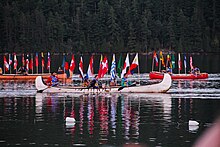This article has multiple issues. Please help improve it or discuss these issues on the talk page. (Learn how and when to remove these messages)
|
Rovers or Rovering is a programme associated with some Scout organizations for adults, originated by The Boy Scouts Association in the United Kingdom in 1918 to provide a programme for young men who had grown up beyond the age range of the Boy Scouts. It was adopted by many other Scouting organisations. A group of Rovers is called a 'Rover Crew'.

Many Scouting organisations, including, since 1966, The Scout Association in the UK, no longer include a Rover programme and some have replaced it with other programmes with modified Baden-Powell Award schemes. Others, mostly Traditional Scouting organisations, maintain the original programme and Baden-Powell Award.
Nomenclature
editRobert Baden-Powell's handbook for Rovers was titled Rovering to Success and, throughout his book and mostly elsewhere, he referred to "Rovers" and "Rovering", not 'Rover Scouts'.[1]
Origins
editThe Rover programme had its origins in two different schemes.[citation needed] The first, aimed at Boy Scouts in the United Kingdom who were aged between 15 and 18 years old, was called "Senior Scouts" which was launched in March 1917 during World War I. It quickly became apparent that there weren't enough adult male leaders available in wartime, and it was several decades before the Senior Scout programme was established. The second scheme was the series of 'Battlefield Scout Huts' provided for the recreation of British and Empire soldiers in rear areas of the Western Front. Related to these was the St George's Scout Club for servicemen, which operated in the English garrison town of Colchester under the leadership of "Uncle" H. Geoffrey Elwes. From these projects, it became apparent that there was a need for a Scouting-related programme that catered for young men, many of whom would shortly be returning from the war.[2]
The first mention of the term "Rover" was by Sir Robert Baden-Powell in The Boy Scouts Headquarters Gazette in August 1918. The booklet "Rules for Rover Scouts" was issued in September 1918, and the scheme was fully established by November 1919. Baden-Powell set about writing a handbook for the new scheme, which was published in 1922 as Rovering to Success[1]. It contained Baden-Powell's philosophy for a happy adult life as well as ideas for activities that Rovers could organise for themselves. It was translated into many other languages and still remains in print in English today, as well as being available in online versions.
Rovering spread to many other countries following its inception in Britain in 1918, although it no longer exists in the Scout Association. Today, the Rover section remains an important programme of Scouting organizations in many European countries, in most member countries of the Commonwealth of Nations (e.g., Canada, Australia, New Zealand, South Africa, India, Malaysia, Singapore and Hong Kong), across Central and South America, the Middle East and in many other countries such as Ireland, Japan, Republic of China/Taiwan, Indonesia, Thailand and Korea. New Zealand Rovers, in particular, hold a National Moot every year over the Easter holiday weekend where international participants are always openly welcomed.
Rovers continued among the troops during the Second World War, even in Prisoner of War (POW) camps. Some artifacts of the Rover Crew at Changi (Singapore), including the crew flag, have been preserved; they are now held by the Scout Heritage Centre of Scouts Australia in Victoria, Australia. Additionally there is an ornate investiture certificate from the Changi Rover Crew in the Changi exhibit in the Australian War Memorial in Canberra.
Age range
editIn his 1922 book, Rovering to Success, Baden-Powell wrote that Rovers "are in point of fact a senior branch of the Boy Scout Movement—young men of over seventeen years of age", "In order to be admitted to a Rover Crew you must be 17, but preferably 18, years of age...." and that Rover training "gives the older boy an aim for remaining under helpful influences at the difficult time of his life when he is just entering on manhood." Baden-Powell repeatedly referred to Rovers as "young men".[1] The 1938 edition of PO&R in the United Kingdom states that "Rover Scouting covers the period during which the young man is 'finding himself,' i.e., developing his character and his powers by training them...."[3] While the programme was clearly aimed at young men, an upper age was not specified.
Today in most Scouting organizations that operate a Rover programme, Rovers starts in the late teens and has an age limit in the mid-20s (see Age groups in Scouting and Guiding). For major international events like the World Scout Moot, participants typically must be 18–25 years old at the time of the event.
In some Scouting organizations, particularly Traditional Scouting associations, Rovering has no upper age limit. Rover may remain Rovers at any age and in some cases adults of any age may join Rovering. In the Baden-Powell Service Association (United States), all adult members are classed as Rovers.
A Baden-Powell Award still forms the Rover award scheme in associations in several countries including Australia, Canada, New Zealand, South Africa, India, Pakistan, Hong Kong and Singapore and for several of the traditional Scouting associations that retained Rovers.
See also
editReferences
edit- ^ a b c Baden-Powell, Robert (October 1959) [1922]. Rovering to Success: A guide for young manhood. London: Herbert Jenkins.
- ^ Walker, Colin. "Rover Scouts – Scouting for Men". scoutguidehistoricalsociety.com. Scouting Milestones. Retrieved 11 October 2014.
- ^ Policy, Organisation and Rules (PDF). London: The Boy Scouts Association. 1 October 1938. Retrieved 29 December 2020.